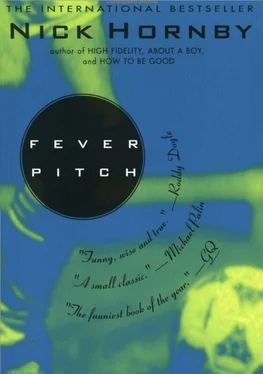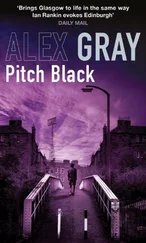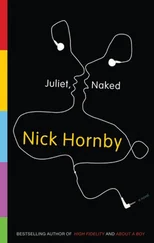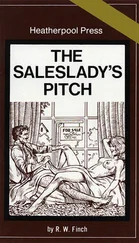The Arsenal-Norwich game at the end of 1989 had seven goals, and Arsenal came back from 2-0 down and then 3-2 down to win 4-3. It had two penalties, one in the last minute with the score at 3-3 (both, incidentally, terrible decisions on the part of the referee) … and Norwich’s Gunn saved it, the ball rolled back to Dixon, who scuffed it, and it trickled, very gently, into the empty net. And then, all hell broke loose, with more or less everyone bar the Arsenal keeper involved in a bout of fisticuffs which seemed to last forever but which was probably over in a matter of seconds. Nobody was sent off, but never mind: how was it not possible to enjoy a game like that?
The two teams were fined heavily, which was only right, of course. In situations like this, the FA could hardly send them a letter thanking the players for giving the fans what they want. And given Arsenal’s later problems, discussed elsewhere, the fight has in retrospect lost some of its gloss. But it’s this centre of the world thing again: after the game we went home knowing that what we had seen, live, was the most significant sporting moment of the afternoon, a moment which would be talked about for weeks, months, which would make the news, which everyone would be asking you about at work on Monday morning. So, in the end, one has to conclude that it was a privilege to be there, to see all those grown men make fools of themselves in front of thirty-five thousand people; I wouldn’t have missed it for the world.
Saddam Hussein and Warren Barton
ARSENAL v EVERTON
19.1.91
A little-known fact: football fans knew before anybody else that the Gulf War had started. We were sat in front of the TV, waiting for the highlights of the Chelsea-Tottenham Rumbelows Cup-tie just before midnight, when Nick Owen looked at his monitor, announced a newsflash, and expressed the hope that we would be able to go to Stamford Bridge shortly. (The report of the game in the Daily Mirror made peculiar reading the next morning, incidentally, given the circumstances: “Wave after wave of attacks left Tottenham hanging on for grim life”, that kind of thing.) ITV beat the BBC to the news by several minutes.
Like most people, I was frightened: by the possibility of nuclear and chemical weapons being used; of Israel’s involvement; of hundreds of thousands of people dying. By three o’clock on the Saturday afternoon, sixty-three hours after the start of the conflict, I was more discombobulated than I can recall being at the start of a football match: I’d watched too much late-night television, and dreamed too many strange dreams.
There was a different buzz in the crowd, too. The North Bank chanted “Saddam Hussein is a homosexual” and “Saddam run from Arsenal”. (The first message is scarcely in need of decoding; in the second, “Arsenal” refers to the fans rather than the players. Which makes the chant self-aggrandising, rather than ridiculing, and which paradoxically reveals a respect for the Iraqi leader absent in the speculation about his sexual preferences. A consistent ideology is probably too much to ask for.)
It was an interesting experience, watching a football match with the world at war; one I had never had before. How was Highbury to become the centre of the universe, with a million men preparing to kill each other a thousand miles away? Easy. Merse’s goal just after half-time earned us a 1-0 win, which would not in itself have been enough to distract attention away from Baghdad; but when Warren Barton’s free-kick got Wimbledon a result up at Anfield, and we went top of the League for the first time that season, everything became focused again. Eight points behind in December and one point clear in January … By a quarter to five, Saddam was forgotten, and Highbury was humming.
ARSENAL v MANCHESTER UNITED
6.5.91
In May 1991 we won the League again, for the second time in three years and the third time in my whole life. In the end there was none of the drama of 1989: Liverpool collapsed ignominiously, and we were allowed to run away with it. On the evening of the 6th May, Liverpool lost at Forest before our home game against Manchester United, and the United game was thus transformed into a riotous, raucous celebration.
If ever a season has exemplified Arsenal, it was that one. It wasn’t just that we lost only one League game all season, and conceded an astonishingly miserly eighteen goals, although these statistics are in themselves indicative of the team’s traditional tenacity. It was that the Championship was achieved despite almost comical antagonism and adversity. We had two points deducted after becoming involved, in retrospect unwisely, in another brawl, less than a year after the exciting Norwich fracas; soon afterwards, our captain was imprisoned after a stupendously idiotic piece of drunken driving. And these incidents came on top of heaps of others, on and off the pitch—fights, tabloid reports of obnoxious drunken behaviour, mass displays of petulance and indiscipline (most notably at Aston Villa at the end of 1989, when most of the team surrounded an unhelpful linesman long after the final whistle, gesturing and shouting to the extent that those of us who had travelled to support them couldn’t help but feel embarrassed), and so on and on and on. Each of these transgressions isolated the club and its devotees further and further from the lip-pursing, right-thinking, Arsenal-hating mainland; Highbury became a Devil’s Island in the middle of north London, the home of no-goods and miscreants.
“You can stick your fucking two points up your arse,” the crowd sang gleefully, over and over again, throughout the Manchester United game, and it began to seem like the quintessential Arsenal song: take our points, imprison our captain, hate our football, sod the lot of you. It was our night, a show of solidarity and defiance that had no grey areas of vicarious pleasure for anyone else, an acclamation of the virtues of all things unvirtuous. Arsenal aren’t a Nottingham Forest or a West Ham or even a Liverpool, a team that inspires affection or admiration in other football fans; we share our pleasures with nobody but ourselves.
I don’t like the fact that for the last couple of years Arsenal have brawled and bitched their way through their seasons, of course I don’t. And I would rather that Tony Adams hadn’t skidded his way down a residential street after a bucketful of lager, that the club hadn’t paid all of his wages while he was inside, that Ian Wright hadn’t spat at Oldham fans, that Nigel Winterburn hadn’t involved himself in a bizarre row with a supporter on the touchline at Highbury. These are, on the whole, Bad Things. But in a sense my feelings are beside the point. It is part of the essential Arsenal experience that they are loathed, and in an era in which more or less everybody plays with an offside trap and an extra defender, perhaps these distasteful incidents are the Arsenal way of upping the ante in order to stake sole claim to the territory.
So in the end, the question of why Arsenal behave like this is not a very interesting one. I suspect that the answer is that they behave like this because they are Arsenal, and they understand their allotted role in the football scheme of things. A more interesting question is this: what does it do to the fans? How is your psyche affected, when you commit yourself for a lifetime to the team that everybody loves to hate? Are football fans like the dogs that come to resemble their masters?
Emphatically, yes. The West Ham fans I know have an innate sense of underdog moral authority, the Tottenham fans give off an air of smug, ersatz sophistication, the Manchester United fans are imbued with a frustrated grandeur, Liverpool fans are simply grand. And as for Arsenal fans … It is impossible to believe that we have remained unaffected by loving what the rest of the world regards as fundamentally unlovable. Ever since 15th March 1969, I have been aware of the isolation my team induces, maybe even demands. My partner believes that my tendency to adopt an attitude of beleaguered defiance at each minor setback or perceived act of disloyalty has been learned from Arsenal, and she may be right. Like the club, I am not equipped with a particularly thick skin; my oversensitivity to criticism means that I am more likely to pull up the drawbridge and bitterly bemoan my lot than I am to offer a quick handshake and get on with the game. In true Arsenal style, I can dish it out but I can’t take it.
Читать дальше











